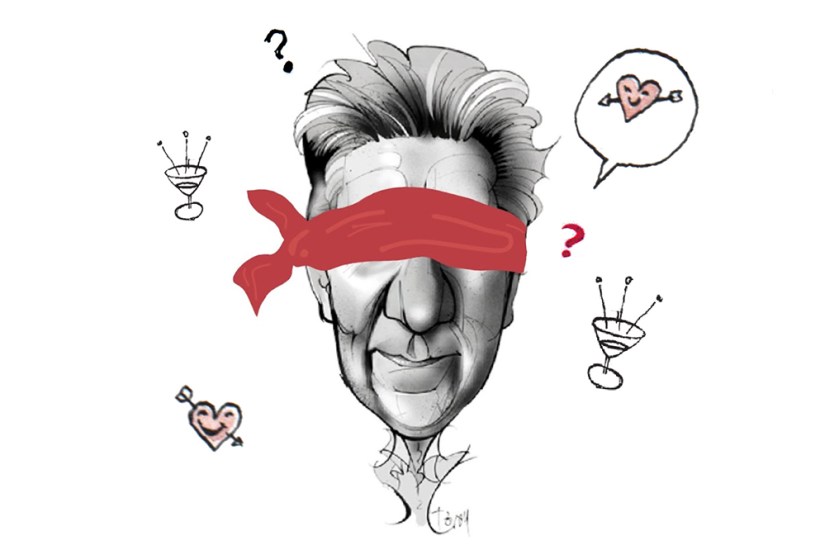Free grub, free booze and the chance to fall in love. That’s the deal offered by Blind Date, a matchmaking strand in the Guardian that brings together lonely hearts and asks them to spill the beans. When I applied for this enticing freebie I had no expectation of being chosen, but my email was answered within hours. Amazing. Randy singletons are in short supply among Guardian readers.
I was asked to describe my ‘interests’, which are rather limited. I tend to avoid travel, sport, art, museums, cars, planes, movies, pubs, music, parties, dancing, eating out or holidays. I’m never invited to dinner by anyone or ‘for the weekend’, thank God. I avoid TV, and my idea of hell is ‘a walk in the countryside’. What I really enjoy is theatre, politics and reading comedians’ memoirs. I felt it highly improbable that the Guardian would find someone who liked me. I can’t.
The advantage of a blind date is the absence of foreknowledge. Meeting people online means sifting through heaps of data – much of it inaccurate. A typical woman in my age group will claim to like ‘grand opera, Caribbean travel and volunteering at shelters’. A lot of women are dog lovers. No amorous woman will admit to owning a cat – with good reason. A pet is an alter ego that reveals how you relate to others. A dog is a son. A cat is a mother-in-law.
The sleuths at Blind Date found me a potential suitor and invited me in for a photo shoot. This was my first visit to the Guardian. The newspaper is based inside a large-ish glass-fronted building which looks like a mental health charity or a firm of international tax-dodgers. I was told to wait beside a cordon of plastic security gates and watched as dozens of hacks swiped themselves out after a long day making Planet Earth safe for the next generation.
An intermediary, Cathy, arrived and went over the practicalities of Blind Date with me. She explained that some of the flakier volunteers misunderstand the arrangement and feel that their privacy has been invaded when they read about themselves in the paper. She led me into a very messy studio occupied by an attractive young photographer named Linda. She then walked out, closing the door behind her. This left the two of us alone in a private room. I asked myself who was most at risk here. Me, the unknown visitor? Linda, the vulnerable snapper? Or the Guardian’s HR department? Luckily, the photo shoot passed off without a #MeToo moment.
I had great trouble finding the restaurant, Brunswick House, which was lurking in the shadowy interstices of a T-junction in Vauxhall. I was heading towards Clapham when I got a call from the long-suffering Cathy who guided me to the rendezvous. There, to my amazement, I found my date – Karin. She’d been at the table for half an hour. In her place, I’d have cleared off after ten minutes.
Karin and I had no trouble gabbling away for two hours and I made a mental note to avoid the topic of Brexit. I think I did all right, and it probably came up only a couple of dozen times. I also had to conceal my detestation of dining out. Following my usual habit, I ordered a side dish from the food-bank end of the menu. We chatted until 9.30 p.m. and then Karin stood up to say farewell. We hugged and she was gone.
Next day, I wrote a review of our date and emailed it to Cathy who gave me top marks for my jottings. ‘I love these answers,’ she gushed. Two weeks later the piece appeared and I sprinted to the newsagent with a pound coin and a few coppers jingling in my pocket. The last time I bought the Guardian it cost 65p so I was expecting the price to have doubled, roughly. But it now costs £3.80. That’s half my weekly food budget.
As I skimmed the piece I was aware that my romantic shortcomings were being chortled over by thousands of lefties sitting in stripped-pine kitchens across north London. The Blind Date strand remains popular because it’s the only part of the paper where ‘heteronormativity’ (i.e. real life) is treated as unremarkable. Women are openly objectified and judged in the bluntest terms. I was asked to describe my ‘first impressions’ of Karin, and I answered ‘a beautiful blonde’. The sub-editor added ‘with lots of patience’, as if this were a virtue I admire. Why doctor my words? I guess that the phrase ‘beautiful blonde’ might have sparked fainting fits among the childless thirtysomething spinsters who buy the paper.
Next, I had to grade Karin as if she were a meat pie or a funfair ride. ‘Marks out of ten?’ I answered ‘11’, as it would have been discourteous to suggest that she was anything less than perfect. Then, a booby-trap question. ‘Would you introduce her to your friends?’ A common response is: ‘My friends would love her.’ But that sounds presumptuous and self-regarding. I said: ‘I only have three friends, Rob, John and Cynthia, and I hope Karin would like them.’ The Guardian redacted the names – perhaps fearing that anyone accused of socialising with me might have grounds for a libel action.
The only change I didn’t like was my answer to the question ‘What do you think she made of you?’ I replied: ‘Shouty far-right nutcase’, which they altered to ‘Shouty and far-right.’ The tone of that phrase is subtly but significantly different from the self-mocking words I submitted. To call oneself ‘shouty and far-right’ sounds like the proud boast of a bona fide goose-stepper.
Finally, the key romantic question: do we lovebirds want to meet again? I said: ‘Yes of course.’ Karin was more equivocal in her replies. ‘Possibly,’ she conceded. Asked if she wished to introduce me to her friends, she answered with sublime obliqueness: ‘Some of them.’
It wasn’t exactly a five-star rave. I turned to Kingsley Amis for comfort. ‘A bad review may spoil your breakfast but you shouldn’t allow it to spoil your lunch.’ I’d happily try again, of course. I know the Guardian likes to give criminals a second chance, but their munificence may not stretch to a hermit with a hungry heart.<//>
Got something to add? Join the discussion and comment below.
Get 10 issues for just $10
Subscribe to The Spectator Australia today for the next 10 magazine issues, plus full online access, for just $10.
You might disagree with half of it, but you’ll enjoy reading all of it. Try your first month for free, then just $2 a week for the remainder of your first year.














Comments
Don't miss out
Join the conversation with other Spectator Australia readers. Subscribe to leave a comment.
SUBSCRIBEAlready a subscriber? Log in